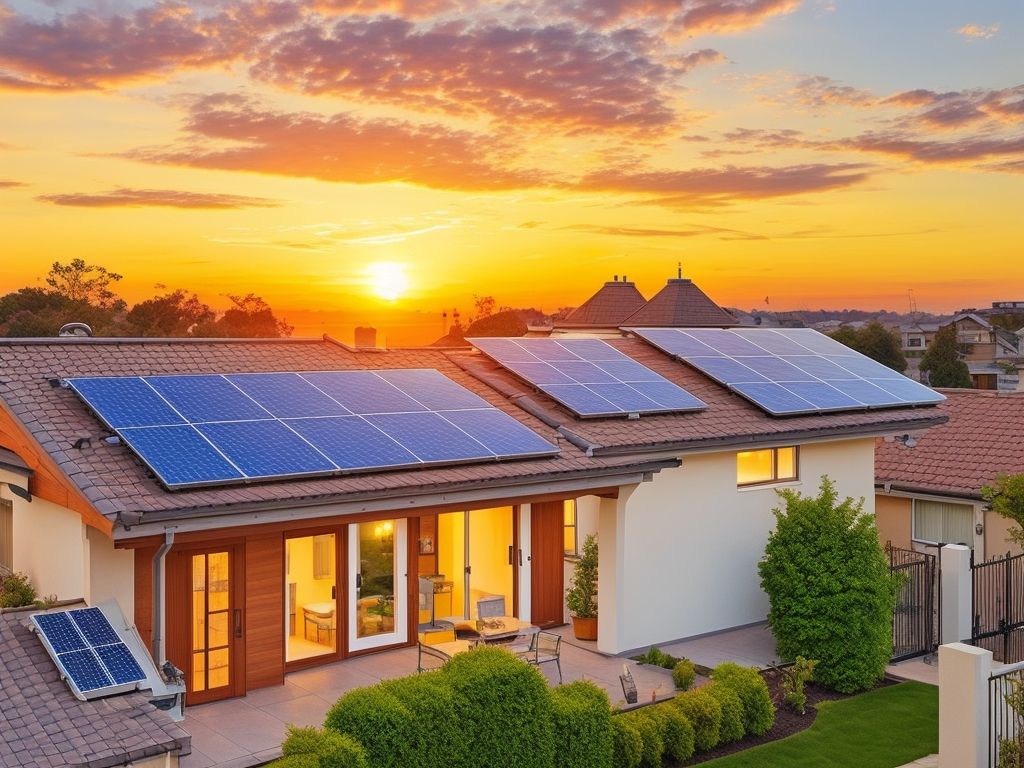Solar panels are a popular choice for those looking for clean and renewable energy. How long do home solar panels last? 25-30 years is the average lifespan of a typical residential solar panel system. The actual life may vary depending on climate, maintenance and quality. Maintenance is key to making them last. Regular cleaning and inspection can help. Investing in high quality solar panels also helps extend their lifespan. A study by NREL found even after 40 years, most solar panels still retain 80% of their initial efficiency. Making them a great, long-term choice for eco-friendly homeowners.
Factors Influencing the Lifespan of Home Solar Panels
The lifespan of home solar panels depends on various factors. Let’s take a look at some of the key ones.
Quality is crucial. High-quality panels can withstand weather and last longer. Low-quality panels may need replacement sooner.
Installation must be done properly by experienced professionals to increase solar panel longevity.
Maintenance is also necessary. Clean, inspect, and service regularly. Surrounding trees should be trimmed to maximize sunlight reception.
Location and climate also matter. Prolonged exposure to extreme heat, hailstorms, air pollution, or saltwater can reduce the lifespan.
Make the most of solar power today! Save money on electricity bills and help build a sustainable future.
Importance of Understanding Lifespan
The lifespan of home solar panels is massive in its importance. Knowing how long they last helps homeowners make smart decisions and get the most from solar energy.
Solar panels are a great investment for those looking for eco-friendly and economical energy solutions. But, without knowledge on their lifespan, it gets tough to predict their long-term performance and worth. When it comes to solar panels, time is money. Therefore, it’s vital to know their running time.
Moreover, understanding the lifespan of solar panels assists homeowners plan for maintenance and replacement costs. Solar panels usually have a warranty of 20 to 25 years. However, their true lifespan can stretch beyond this period. By keeping an eye on their usable life, homeowners can budget correctly and ensure continual operation throughout the system’s life.
Interestingly, the National Renewable Energy Laboratory (NREL) states that even after 25 years, solar panels still perform at an average efficiency of 80%. This proves the reliability and durability of these renewable energy systems.
Steps to Maximize the Lifespan of Home Solar Panels
For long-lasting home solar panels, these 6 steps are key. Taking the right precautions can help homeowners benefit from renewable energy for years!
- Get Professional Installation: Avoid potential issues by hiring a pro with solar system experience.
- Do Regular Maintenance: Clean panels, check connections, and inspect for damage or wear.
- Protect from Extreme Weather: Secure mounting systems help shield panels from storms.
- Monitor System Performance: Keep an eye out for output levels and any efficiency drops.
- Utilize Warranty Coverage: Understand the warranty terms/conditions and use if needed.
- Seek Professional Assistance: Get help diagnosing/resolving complex problems from a qualified person.
By following these steps, homeowners can make their solar panels last. Plus, use monitoring tools/apps to easily identify any changes in output and address them quickly.
Signs of Deterioration or Faulty Panels
Solar panels are a great long-term investment for homeowners. Knowing the signs of deterioration or faultiness is key, to make sure they work efficiently and last a long time. Here are some indicators to keep an eye out for:
- 1. Declining energy production: Track your system’s performance to detect sudden drops in electricity.
- 2. Physical damage: Check for cracks, warping, or moisture penetration.
- 3. Discolouration or dark spots: This can signal internal corrosion or debris.
- 4. Constant system malfunctions: Shutting off inverters or electrical shorts could mean something is wrong.
- 5. Rising electric bills: Monitor your energy output alongside consumption to get an idea.
- 6. Age and warranty expiration: Solar panels last typically between 20-30 years.
Cleaning and regular maintenance should also be done to avoid build-up of dirt, grime and debris. For optimal performance and to increase the lifespan of your solar panel investment, have a professional technician look at them once a year.
Common Misconceptions about Solar Panel Lifespan
Many believe solar panels only last a few years, but this isn’t true. Solar panels can last up to thirty years or more if cared for properly.
Some think they degrade quickly, but modern tech has reduced this issue. Most solar panels come with warranties for 25 years, showing their strength.
Many also think extreme weather will damage them beyond repair. Although severe events like hailstorms or hurricanes may cause damage, reputable makers design solar panels to withstand such conditions. They go through tough tests to guarantee their ability in tough climates.
Regular maintenance and cleaning are key to making solar panels last. Dirt, dust, and debris can build up and reduce efficiency. Professional inspections help spot any potential issues early, allowing optimal performance and lengthening the lifespan.
To show the longevity of today’s solar panels, here’s a true story. In 1978, an engineer installed one of the first residential solar panel systems in California. These early stage solar panels have now worked for over four decades and still run at a great efficiency level.
In conclusion, many misconceptions exist about the lifespan of home solar panels. However, with proper maintenance and modern technology, they can last 25-30 years or more. Plus, they can withstand extreme weather, making them a reliable long-term renewable energy investment.
Conclusion
The life of home solar panels varies depending on quality, maintenance, and environment. Usually, they last 25-30 years. But, newer tech and improved production processes suggest longer life.
Materials are key for solar panel durability. Most residential panels are made of silicon-based photovoltaic cells. These are protected by strong glass and framed in aluminum or metal. This makes them resilient to harsh weather like snow, hail, and strong winds.
Good maintenance is key for longevity. Cleaning to remove dirt and debris boosts efficiency and prevents damage. Inspecting the system regularly can spot problems early for faster repairs.
Solar panel energy output slowly drops over time due to natural wear. Manufacturers offer a warranty of 80% performance after 25 years. This confirms their trust in the long life of solar panel systems.
Tip: Invest in high-quality gear and reputable installers. Make sure they offer extensive warranties. Keep up with maintenance and cleaning for optimal performance.
Frequently Asked Questions
FAQs about the lifespan of home solar panels:
1. How long do home solar panels typically last?
Home solar panels are designed to last for 25 to 30 years on average. However, their actual lifespan can vary depending on various factors such as the quality of the panels, maintenance, and environmental conditions.
2. What factors can affect the lifespan of home solar panels?
The lifespan of solar panels can be influenced by factors such as weather conditions, maintenance, panel quality, and the type of technology used. Proper maintenance, like regular cleaning and inspections, can help prolong their lifespan.
3. Are there any warranties for home solar panels?
Yes, most reputable solar panel manufacturers offer warranties ranging from 20 to 25 years. These warranties cover defects in materials or workmanship and can provide additional protection and peace of mind for homeowners.
4. Can solar panels be repaired if they stop working?
Yes, in most cases, if a solar panel stops working, it can be repaired. Many manufacturers provide repair services, and there are also specialized technicians who can diagnose and fix issues. However, it’s essential to check the warranty and contact a professional for repairs.
5. Is it necessary to replace the entire solar panel system after its lifespan ends?
No, it’s not always necessary to replace the entire solar panel system after its lifespan ends. Typically, only individual panels that no longer generate sufficient electricity need to be replaced. The rest of the system, such as inverters and wiring, can often continue to be used.
6. What happens to the solar panels after their lifespan ends?
Solar panels can be recycled at the end of their lifespan. The process involves separating and reusing valuable materials such as silicon, glass, and aluminum. Recycling reduces waste and allows for the sustainable production of new solar panels.
Related posts:
- How Much Does Solar Increase Home Value? | Zillow Insights
- How Much Do Home Solar Panels Cost? A Complete Guide to Solar Panel Prices
- Determining the Perfect Size: How Much kW Solar Panel is Required for Your Home
- How Many Solar Panels to Power Home? A Comprehensive Guide on Calculating Solar Panel Requirements



